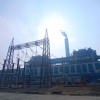'Rampal plant to affect Sundarbans’ wildlife, aquatic resources'
Huge dredging of the rivers in and around the Sundarbans and transportation of coal for Rampal power plant will seriously affect the fish, wildlife and other aquatic resources in that region, scientists said in a new report today.
"Dredging and sediment disposal in estuarine and coastal waters such as the Sundarbans Reserve Forest and Bay of Bengal will increase turbidity and sedimentation, affecting light availability for marine organisms" it said.
READ MORE: Sundarbans risks being World Heritage in Danger
It will affect the growth and survival of organisms living at the water bottom and dolphins, fish and water birds, said the report titled "critical review of shipping and dredging plans to facilitate coal transport for the coal-fired power plant at Rampal".
Weekly 8 to 16 ships will transport coal through the rivers passing inside the Sundarbans, and the coal would be loaded and unloaded at Akram Point, according to the report.
"Excessive sound and lighting will affect the water life. As a result, they would move away," said agriculture and environment expert Prof Anwar Hossain of Bangladesh Agriculture University, while presenting the report.
Dr William Kleindl, research faculty at Montana State University & the University of Montana, US, and Dr Jon Brodie, professional research fellow at ARC Centre of Excellence for Coral Reef Studies at the James Cook University, Australia, prepared it early this year on request from The National Committee for Saving the Sundarbans free of cost.
They reviewed Bangladesh government's five documents, including final report on environmental impact assessment (EIA) of Rampal power plant; consulting services on coal sourcing, transportation and handling; summary of EIA on dredging and feasibility study for dredging in Passur River from Mongla Port to Rampal.
The National Committee on Saving the Sundarbans and Bangladesh Paribesh Andolon (BAPA) revealed it at a press conference at the Prof Sirajul Islam Auditorium of Dhaka University.
Citing Bangladesh government’s reports, the review report said over 33 million tons of dredge spoil are proposed to be removed from the Bay of Bengal and Passur river to create channel for coal transport to the Rampal project site.
In 2015, the World Heritage Committee had requested Bangladesh to conduct a separate EIA for dredging as it found the EIA for Rampal power plant inadequate with respect to the threats posed by dredging.
Bangladesh government in August 2016 released two additional documents related to dredging, but those documents are not independent, comprehensive or scientifically sound, the review report said.
"They do not meet the guidelines of the World Heritage Advice Note on Environmental Assessment, which includes rigorous environmental assessment early in the decision process," it said.
According to the report, Bangladesh government in a document claims the dredge spoil would be dumped in the upstream of Passur river, but in another document it said it would fill up the low land of Rampal plant area and build a dyke so the spoil does not go to the river again.
Scientists, however, observed there are high potentials that the said low land would be flooded as this area is one meter higher than the sea level. Thus, it would pollute the river and underground water.
On the other hand, as per the government document, the 30 million tons of sediments removed in between Akram Point and the Bay of Bengal will be dumped into the Bay of Bengal. This will put the aquatic ecology, dolphins and the Sundarbans under serious threat, Dr Anwar Hossain said.
UNESCO and International Union for Conservation of Nature recommended an effective action plan and emergency response facility to respond to shipping accidents. Bangladesh government claims it has adhered to the recommendations with the creation of National Oil Spill Contingency Plan, but it does not reflect the reality.
"On January 13 this year, coal ship MV Aichgati sank at the mouth of the Passur River, spilling over 1000 tons of coal and hundreds of gallons of fuel oil adjacent to the Sundarbans. The government, however, has made no effort to date to remove the ship or spilled toxic fuels," said Prof Anwar Hossain.
The review report says Bangladesh clearly recognizes that during operation of the plant, vessel movement through the rivers passing inside the Sundarbans will increase significantly for transporting coal and oil. Trans-shipping 472 to 944 ships annually mean about 145 days of active trans-shipment at Akram Point.
This is, however, clear violation of the Bangladesh Environment Conservation Act 1995 and the Forest Act 1927 as these acts make the Sundarbans as reserve forest and protected area where there would be no commercial activities that damage forest and wildlife resources.
"If these activities are allowed to operate at Akram Point, then the EIA has not sufficiently assessed the threats to forest and wildlife resources within the Sundarbans," the report said.
India's state-owned National Thermal Power Corporation and Bangladesh Power Development Board are constructing the 1,320 megawatt plant on 1,834 acres of land in Rampal of Bagerhat, 14km north of Sundarbans, the world's largest mangrove forest, also a Unesco world heritage site.
Green groups have been protesting its construction near the Sundarbans, which acts as a natural barrier against cyclones.
Global environment organization, Greenpeace, early last month said Rampal power plant would cause at least 6,000 premature deaths and low birth weights of 24,000 babies during its 40-year life due to air pollution from coal burning.
Dr Abdul Matin, member secretary of the National Committee on Saving the Sundarbans, said international scientists have so far prepared 12 reports assessing the damages to be caused by the Rampal power project.
"We have released nine of those. The government, however, has been rejecting the reports," he said and added that after the Eid they would meet the authorities concerned and formally present the scientific findings.
BAPA Vice President Rasheda K Chowdhury, Dhaka University economics Professor MM Akash, geology professor Badrul Imam and geology and environment professor M Shahidul Islam also spoke.

 For all latest news, follow The Daily Star's Google News channel.
For all latest news, follow The Daily Star's Google News channel. 








Comments